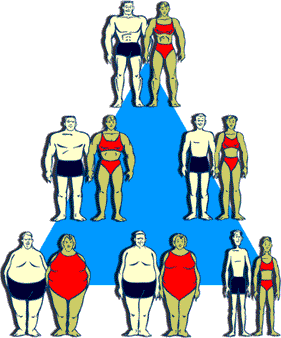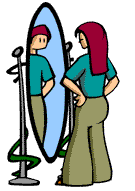|
What's
your type?- Outcome B (7-9)-4
|

The activities below have been chosen to demonstrate the relative
strengths of the three Sheldon body types.
Start
the class with a five-minute warmup. Explain to the students
they will be doing three different types of activity and that
they should make mental notes about how they feel participating
in each activity.
|
- As
part of a games unit, try to have students participate in games
that provide an opportunity for cardiorespiratory improvement.
E.g., drills that include lots of running. Three on three games
can ensure maximum participation and encourage running.
- As
part of the warmup have students challenge themselves with strength
activities. E.g., passing a medicine ball, performing push-ups,
holding a 10lb weight at arm's length for a full minute.
- Provide an opportunity
for students to stretch all body parts fully.
Let's
talk about it
Ask
students to reflect on which components of the class were easier
or harder?
Now is a good time to
review body types and their attributes. Keep the focus on the strengths
of each body type. Let them know that everyone is a combination
of each body type and few people fit one profile exactly. You may
want to make the connection between the physical activity, how the
students felt and the body types.
|

Variation
(Grade 8/9)
Mirror
Mirror on the wall (Influences on body image)
|
 |
|
This
can be done in a 15-minute discussion after an activity lesson
or during a time when you don't have access to the gym or
activity space.
Have
the students tell you the celebrity or athlete they most admire
and assign a body type to each. Use fitness magazines and
fashion magazines and discuss the differences in body types
depicted in each.
|
|
Ask
students to list other influences on body image (parents,
peers, opposite gender) and to decide for themselves whether
those influences are positive or negative.
Have
students reflect on the following question:
Would it be more difficult for an Olympic shot put thrower
to run a marathon than a gymnast? Why?
|
back
to top
|


